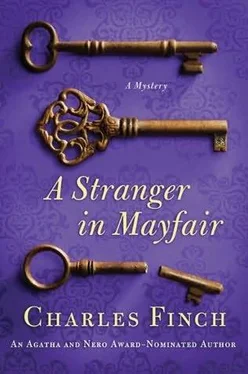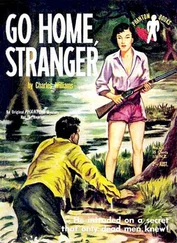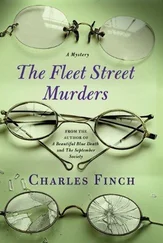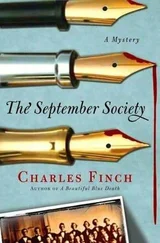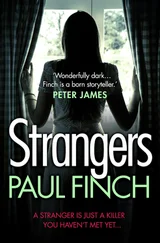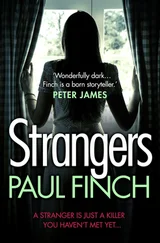Charles Finch - A Stranger in Mayfair
Здесь есть возможность читать онлайн «Charles Finch - A Stranger in Mayfair» весь текст электронной книги совершенно бесплатно (целиком полную версию без сокращений). В некоторых случаях можно слушать аудио, скачать через торрент в формате fb2 и присутствует краткое содержание. Жанр: Исторический детектив, на английском языке. Описание произведения, (предисловие) а так же отзывы посетителей доступны на портале библиотеки ЛибКат.
- Название:A Stranger in Mayfair
- Автор:
- Жанр:
- Год:неизвестен
- ISBN:нет данных
- Рейтинг книги:3 / 5. Голосов: 1
-
Избранное:Добавить в избранное
- Отзывы:
-
Ваша оценка:
- 60
- 1
- 2
- 3
- 4
- 5
A Stranger in Mayfair: краткое содержание, описание и аннотация
Предлагаем к чтению аннотацию, описание, краткое содержание или предисловие (зависит от того, что написал сам автор книги «A Stranger in Mayfair»). Если вы не нашли необходимую информацию о книге — напишите в комментариях, мы постараемся отыскать её.
A Stranger in Mayfair — читать онлайн бесплатно полную книгу (весь текст) целиком
Ниже представлен текст книги, разбитый по страницам. Система сохранения места последней прочитанной страницы, позволяет с удобством читать онлайн бесплатно книгу «A Stranger in Mayfair», без необходимости каждый раз заново искать на чём Вы остановились. Поставьте закладку, и сможете в любой момент перейти на страницу, на которой закончили чтение.
Интервал:
Закладка:
“To protect Collingwood?”
“Or indeed to protect Ludo. Has anyone’s behavior through this entire mess been stranger?”
“He would hardly give his own father to the police.”
“You may be right there.”
“Besides, as always,” said Dallington, “there’s the question of the attack on Ludo. What are we to believe: that Ludo killed Freddie Clarke and then was attacked by random chance in the same alleyway?”
Lenox, with a defeated sigh, looked out through the window. “What do we know?” he said at length. “We know that Paul Collingwood, a butler, killed a footman working under him-possibly to protect his own job. We know that subsequently someone, perhaps Collingwood, attacked Ludo Starling-but for reasons that are dark to us. The problem is there’s no internal logic to any of these actions. Clarke saw Collingwood nick a few coins, and that’s why he’s dead? And then why attack Ludo?”
“Perhaps it’s the work of a madman, and we’re looking at it all wrong.”
“Maybe, maybe…”
“Here we are.”
“You’ll go speak with Collingwood?” said Lenox.
“Directly. Good luck in there,” he added, nodding to the Members’ Entrance.
Lenox stepped out of the cab. It was turning into a wet, cold day, and the falling rain managed to shiver into his collar before he got inside.
Once there, he saw the milling mass of Members he had expected. Before he entered the fray he decided to go up a back staircase to his office and find Graham, to discover what his progress had been on the water issue.
His tiny, drafty office was open, and entering he saw that Frabbs was at one of the two clerk’s desks, his tie loosened and his face cheery.
“Lenox, my dear sir!” he said, lurching up from his seat. “Shake my hand, you old stiff!”
“Excuse me?” said Lenox incredulously.
Just at that moment Graham darted out of the inner office. “Hello, sir,” he said. “Unfortunately I stood the young gentleman a glass of wine for lunch-in celebration, as it were-and he seems still to be feeling the effects.”
Frabbs grinned and appeared to wobble on his feet.
“We’ll spare him a flogging, then,” said Lenox. “Graham, come into my office for a moment, will you?”
“Of course, sir. I was just putting the new blue books on your desk.”
It was dim, the small mullioned window all but lightless; even on a sunny day it wasn’t very bright. “Is he doing well?” asked Lenox.
“He’s only fifteen, sir, and as a result is somewhat inexperienced as a clerk. But I can attest that he’s extremely quick-witted, a fast learner.”
“Well; as long as you don’t give him any more wine we’ll keep him on, then. Really I wanted to hear about your work here.”
Graham looked grave. “Unfortunately there seems to be very little sentiment in favor of the idea of a new water system in East London, sir. Nearly all of the numerous people I’ve spoken to on the subject pointed to the great planning and expense that went into Mr. Bazalgette’s new system.”
“What about the flaw in it, though? The risk of a new cholera epidemic?”
“To a man they have responded with the observation that the new coverage of London is an improvement, and that further changes would be both costly and difficult to win support for on the floor of the House.”
Lenox laughed bitterly. “In short, I arrive here too late.”
“For this issue, sir, I fear that may be true.”
“Did nobody grasp the gravity of our position? One case of cholera in Bethnal Green and people in Piccadilly could be dead tomorrow!”
“Some think that possibility remote, and if I may speak openly, I agree. Houses in the more affluent sections of London are well enough ventilated, and the new water system is well designed enough, that West London would likely be safe.”
“Then what about the poor souls on the other side of the city!”
Graham looked troubled but offered nothing except “I’m sorry to have failed, sir.”
Lenox moved over to the window and put his palm against its glass, cool from the rain. “It’s not your fault.” He turned. “Did nobody agree to approach the leadership with me?”
“Your brother, Mr. Lenox. And-well-” Graham looked doubtful. “Mr. Blanchett expressed some interest in the idea.”
“Just my brother, then.”
“Yes, sir.”
Blanchett was the House eccentric, a mining baron who thought England should be a strict monarchy and therefore refused to vote. He belonged to no party and supported only ideas that would prove the government’s past foolishness. It was a bad sign that he liked Lenox’s idea.
“I’m going to go down, then,” said Lenox. “I know a hundred men in this building. One or two of them must listen, mustn’t they?”
“Yes, sir,” said Graham loyally, though Lenox could see he didn’t believe it at all.
Downstairs Lenox didn’t speak to any of those hundred men; instead he found his brother, who was only there, rather than in the back rooms with the cabinet, preparing for the debate, because he wanted to see Charles on his first true day in Parliament.
“There you are,” said Sir Edmund. “Why do you look as if you swallowed a fly?”
“Graham says there’s no hope.”
“The water supply? No-no, I wouldn’t have thought so. You must wait, Charles. Wait a year or two, until you have more friends and allies here. Or, though I don’t like to say it, wait until there’s a bit of cholera about and people are walking through Hyde Park with handkerchiefs over their noses again.”
“You were right all along-I know that, now.”
“Come, let’s go into the chamber. The session will begin soon. You must start planning your first speech, at least.”
Chapter Thirty-Two
Lenox didn’t get home until past two in the morning, only about half an hour after the session had finished. To his surprise and pleasure, he found Lady Jane waiting up for him.
“My wife,” he said, and smiled at her with tired eyes.
She stood up and without speaking gave him a fierce hug, clutching him tightly to her, face buried in his chest. When she looked up at him it was with tears in her eyes. “Since we returned from our honeymoon everything has been…wrong.” Gesturing at the hallways she said, “Even our houses don’t feel right together yet.”
“I think perhaps it takes time, Jane. We’re not used to being married yet. On the Continent it was all somehow unreal-somehow child’s play. Now we’re back to real life.”
“It was bad timing, Toto and Thomas having their baby.”
“What do you mean?” he asked. She was still clutching him, her face just visible in the half-light of the hallway. The house was quiet.
“I don’t know what I mean,” she said. She started to cry again. “I’m so sorry, Charles.”
“I love you,” he murmured.
“I love you more than all the world.”
“Here-cheer up,” he said. “Come and sit with me. We’ll have a cup of hot chocolate.”
“We can’t get the servants up.”
“You forget that I had to fend for myself once upon a time. There was Graham, of course, but I warmed up the odd cup of tea. At Oxford I once even made sandwiches for a young woman I liked.”
With mock suspicion, Lady Jane said, “Who is she, the harlot?”
“She wasn’t a harlot, of course. It was you.”
She looked confused and then laughed with recognition. “That’s right, I did visit you. Those were delicious sandwiches. I remember thinking you must have had a good scout, with salmon and every nice thing to offer me. Well-hot chocolate is just what I’d like.”
Like disobedient children they crept down the stairs to the basement, which held the servants’ quarters and the oversized, still-warm double kitchen of both their houses. With just a candle to light the way between them, whispering, they went and lit the stove. Jane burrowed through the cabinets until she found a few bars of chocolate, brought back from Paris, and then looked in the iced crate below the cabinets to find the last of the day’s milk.
Читать дальшеИнтервал:
Закладка:
Похожие книги на «A Stranger in Mayfair»
Представляем Вашему вниманию похожие книги на «A Stranger in Mayfair» списком для выбора. Мы отобрали схожую по названию и смыслу литературу в надежде предоставить читателям больше вариантов отыскать новые, интересные, ещё непрочитанные произведения.
Обсуждение, отзывы о книге «A Stranger in Mayfair» и просто собственные мнения читателей. Оставьте ваши комментарии, напишите, что Вы думаете о произведении, его смысле или главных героях. Укажите что конкретно понравилось, а что нет, и почему Вы так считаете.
